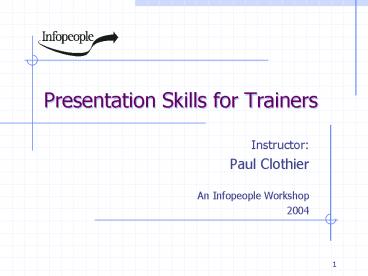Presentation Skills for Trainers - PowerPoint PPT Presentation
1 / 28
Title:
Presentation Skills for Trainers
Description:
1. Presentation Skills for Trainers. Instructor: Paul Clothier. An Infopeople Workshop ... Infopeople is a federally-funded grant project supported by the ... – PowerPoint PPT presentation
Number of Views:35
Avg rating:3.0/5.0
Title: Presentation Skills for Trainers
1
Presentation Skills for Trainers
- Instructor
- Paul Clothier
- An Infopeople Workshop
- 2004
2
This Workshop Is Brought to You By the Infopeople
Project
- Infopeople is a federally-funded grant project
supported by the California State Library. It
provides a wide variety of training to California
libraries. Infopeople workshops are offered
around the state and are open registration on a
first-come, first-served basis. - For a complete list of workshops, and for other
information about the Project, go to the
Infopeople Web site at infopeople.org.
3
Outline
- Interacting with Learners
- Presenting Information
- Clarity and Simplicity
- Questioning
- Analogies
- Using Humor
- Dealing with Difficult Learners
4
Good Training
- Good training presentation is mastery of
- communicating information clearly
- communicating effectively with learners
- managing the room
5
Encouraging independence
- Dont just tell themask them
- Have them verbalize concepts
- Have them do most of the work
- Have them evaluate their progress
- Teach them to be independent
6
Written Exercise
- 1 Encouraging Independence
7
Interacting with learners
- Create a non-threatening environment
- Train by walking around
- Use learners names
- Interact with everyone
- Encourage learner-learner interactions
8
Adapting to Learners
- Use examples they can relate to
- Adapt to their personality styles
- Stay flexible, open, and accepting
- Adapt to age and ability differences
- Address their fears and concerns
9
Managing Their Fears
- Manage prerequisites!
- Try to gauge beforehand what their fears may be
- Help them relax early on
- let them know they are not alone
- share your experiences
- let them talk and share their concerns
10
Written Exercise
- 2 Managing their Fears
11
Managing Your Fears
- Be prepared!
- know your presentation
- rehearse
- Chat with learners before starting
- Transmute nervousness into energy
- Ask them questions
12
Written Exercise
- 3 Managing Your Fears
13
Presentation Structure
- 1. Tell them what you are going to tell them
- Outline, agenda, questions
- 2. Tell them
- Main content, questions
- 3. Tell them what you told them
- Summary, review, questions
14
Clarity and Simplicity
- Explain ideas or concepts clearly
- study, plan and practice
- If you truly understand it - you can explain it
simply - study, plan and practice
15
Exercise
- Clear and Simple Presentations
16
Engaging Your Audience
- Be energetic!
- Move around!
- Speak with enthusiasm and passion!
- Maintain eye contact
- Use vocal variety
17
Teaching Visually
- Always utilize the whiteboard or flipchart!
- Draw diagrams whenever possible
- Draw pictures in the air
- Create pictures in their mind
18
Content Structure
- The sum is greater than the parts
Make sure you show them the big picture
19
Exercise
- Diagrams that Communicate
20
Questioning
- Use Open-ended or Reflexive questioning
- Try to ask more and tell less
- Address thinking rather than memorization
- Lead learners to the right answer
- Wait for their responses
- Dont put anyone on the spot
21
Written Exercise
- 4 Questions
22
Linking Ideas Using Analogies
- Use every opportunity to relate the content to
learners experience - Use analogies often - particularly with highly
conceptual content - plan them beforehand
- choose clear and appropriate ones
- ask learners for analogies
23
Exercise
- Creating Useful Analogies
24
Using Humor
- Facilitates learning
- Relaxes participants
- Builds rapport
- Defuses tense situations
- Improves your evaluations -)
25
Dealing with Difficult Learners
- We cannot directly change the learners
behavior... - we can only change our attitude to it.
26
Types of Difficult Learners
- Lacking Confidence
- Slow Learner
- Fast Learner
- Wide Range of Abilities
- Not Listening
- Student Answers all Questions
- Upset/Stressed/Lost
- Angry, Upset, Aggressive
- Apathetic, Bored
27
General Guidelines
- 1. Actively listen.
- 2. Try not to view anyone as a problem.
- 3. Understand what their needs are and try to
satisfy. - 4. Dont take anything personally.
- 5. Never reflect their attitude.
- 6. Focus on their behavior, not on their
personality. - 7. Be unbelievably patient
28
Exercise
- Mini-presentation






![NOTE: To appreciate this presentation [and insure that it is not a mess], you need Microsoft fonts: PowerPoint PPT Presentation](https://s3.amazonaws.com/images.powershow.com/4691906.th0.jpg?_=20200514087)
























